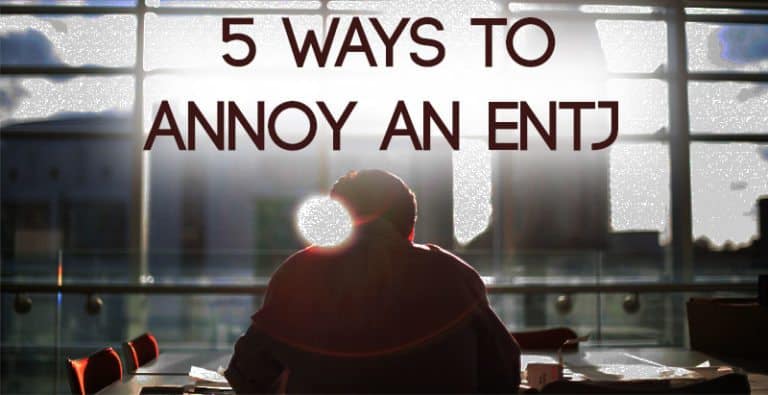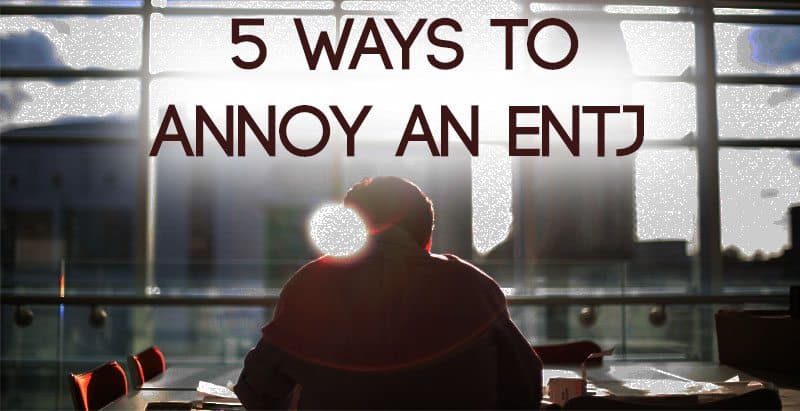10 Things People Misunderstand About INTJs
For the INTJ, life is about peering into the distance and seeing patterns, predictions, and possibilities. We’ve called INTJs the Strategists because of their capacity to think ahead and plan out a logical and effective way to accomplish nearly any goal. These visionary personality types thrive on putting their ideas and theories to work in the real world. And while INTJs are often valued for their plans and ideas, they are frequently misunderstood in their personal lives. Many people misinterpret their feelings, label them as “cold” or “robotic,” and neglect to recognize their true depth of feeling and insight. So let’s take a look at ten things people don’t understand about INTJs.
Not sure what your personality type is? Take our new personality questionnaire here. Or you can take the official MBTI® here.

10 Ways That INTJs Are Misunderstood
#1 – People Think INTJs Don’t Care
Each of the 16 personality types shows their care and concern for others in very different ways. For INTJs, the way they show they care is by using a process called Extraverted Thinking, or “Te” for short. This process is all about creating logical strategies, using if/then logic, and pass/fail metrics in order to create solutions for people.
When INTJs try to show care and support for others they do this by providing logical advice and focusing on objective criteria. This can look detached to other people, or overly impersonal. Many people fail to see the heart behind the INTJ’s actions; instead only seeing them as “bossy” or emotionally uninvested.
#2 – They’re Always Cast as the Villains in a Story
If you’ve recently taken a personality questionnaire and gotten an INTJ result, chances are you’ve seen a whole host of movie villains labeled with the INTJ personality type. Many people falsely assume that a Thinking preference indicates a lack of ethics, compassion, or kindness. This simply isn’t true. Your personality type does not indicate how good of a person you are or how kind of a person you are. It only indicates the ways in which you are likely to perceive the world and make decisions. And everyone, no matter their type, shows kindness in different ways. Being an INTJ does not make you a cold, unfeeling villain so let’s put that stereotype to rest.
Of course, there are INTJ movie villains out there (we’re looking at you, Antonio Salieri), there just aren’t as many as the internet would imply.
#3 – People Assume They “Don’t Like People”
Some INTJs don’t like people. But then again, some ESFJs don’t like people and some ISFPs don’t like people. Not liking people has nothing to do with your personality type. That said, introverts get drained from social interaction more quickly than extroverts do, and INTJs are no exception. This means that they might not like parties or group activities as much, and that’s okay. Each personality type has their own unique needs when it comes to socialization, but it doesn’t mean they dislike people as a whole.
What people often miss about INTJs is that, while they may seem distant and uninterested in small talk, they are deeply interested in meaningful connections. INTJs want to discuss ideas, ponder meaningful topics, and engage in intellectual discovery. They crave friendship and understanding, but they often find it difficult to find people who can engage them on their level. And as introverts, they also need ample alone time each day in order to maintain their energy.
#4 – Their Directness is Seen as a Personal Attack
Do you remember how in point #1 we talked about how INTJs show they care? For the INTJ, showing care and concern is achieved by being direct, troubleshooting, and coming up with logical solutions.
Stuck in a bad relationship? INTJs might suggest looking for a partner with different characteristics the next time.
Tired of your job? INTJs might suggest that there’s a pattern of you only seeing the negative in every job after a certain period of time.
Struggling with financial concerns? The INTJ might critique some of your budgeting choices or offer a new budgeting strategy.
INTJs don’t like beating around the bush and they figure that if a problem arises, the direct route is the easiest and the most considerate. After all, they don’t want to waste anyone’s time!
Unfortunately, their directness can be seen as a personal attack or an insensitive approach. INTJs don’t intend it this way; they just want to help people see the world in a more logical way and come up with practical solutions that will truly solve the problem at hand. Of course, this is what they too would want if they had a problem.
#5 – Their Analytical Approach May Seem Fault-Finding to Others
INTJs are naturally analytical people, and when they care about someone they will try to figure out how that person works. They’ve often learned that their direct approach can ruffle some feathers, so many INTJs revert to asking questions and being curious about the differences between themselves and others. Unfortunately, some personality types get suspicious of the questions and feel like they’re being criticized or put under the microscope rather than being cared about.
INTJs don’t ask people questions about themselves so they can pick out the flaws; they do it to understand how people think and where their perspectives may vary. Rather than being an exercise in fault-finding, it’s an effort to understand different modes of thinking and learn why certain people act the way they do.
#6 – Some Types Think INTJs are “No Fun”
What an INTJ finds exciting and entertaining is often different from what other types naturally gravitate towards. ESFJs, for example, are likely to find social engagements and parties to be a blast, while INTJs might find the idea of walking into a party the equivalent of getting a root canal at the dentist. ESTPs seek out spontaneous adventures and vivid sensory experiences. INTJs may plan out occasional adventures, but can get overwhelmed with a lot of spontaneity and sensory overload quickly.
This doesn’t mean that INTJs are no fun; it means that their idea of fun is different from other personality types. An INTJ might experience joy through researching a theory about the universe, mapping out a business strategy, or discussing philosophical topics with like-minded people. Of course, they may also enjoy rock climbing, going on hikes, or going to a mind-bending movie that toys with their way of thinking.
Rather than throwing out the notion that INTJs are no fun, maybe we should consider that “fun” just means different things to different people.
#7 – They Are Seen as Argumentative as Children
Intuitive-Thinking types are often seen as contrary or argumentative in childhood. This is because they’re naturally skeptical and learn by questioning standards to see what remains when all pretense, tradition, and “rules for the sake of rules” are taken out of the picture. INTJs will often ask for evidence or a logical explanation before they agree to go along with something, and they don’t mind challenging authority figures.
INTJs can also be quite stubborn, and are unlikely to “go along to get along” if they’re being asked to do something that makes no logical sense to them. For example, they may not acquiesce to making small talk with a relative at a family gathering if they have no interest in making small talk. What is logically wrong with being quiet, they might argue? And why should they feign interest in the weather? Isn’t that dishonest?
This doesn’t mean that INTJ children don’t want to cooperate. In fact, many learn that cooperation to a certain degree is more effective because it wastes less time. But they crave authenticity in their actions and choices, and can put up quite a fight if they feel coerced into being someone they’re not.
#8 – People Interpret Their Silence as Lack of Care
INTJs are naturally private people who show their concern for others through actions and troubleshooting more than superfluous words. They may not say “I love you” as frequently as other types; but their actions, loyalty, and commitment to a cause or relationship will speak volumes. They figure that their actions speak for themselves, and often find repeating certain phrases pointless. For example, an INTJ might think: “Why should they say “I love you” every single day when my actions prove it over and over again? Why would my love have suddenly disappeared while the actions remain?”
INTJs also tend to be less emotionally expressive than other types. While another type might beam, laugh, and flirt effortlessly, the INTJ may appear relatively stoic — or worse, uninterested. But don’t be fooled! INTJs care deeply and often have much richer inner emotions than the people around them realize. They just don’t wear their hearts on their sleeves, and sometimes they aren’t even aware that their emotions aren’t showing on the outside.
Unfortunately many partners, friends, or family members write off or downplay the INTJ’s care and concern because their emotional expression isn’t “up to par” for them. This can leave the INTJ feeling unappreciated and misunderstood, because they do put a lot of effort into actions that show they care. Many times it feels like the difficult things they do to support others are swept under the rug because people can only fixate on their emotional expression or lack thereof.
#9 – People Don’t Respect Their Specific Needs
Sometimes INTJs feel misunderstood simply because others don’t respect what they need to function at their best. INTJs need a great deal of autonomy and tranquility in their lives, and struggle when life is unpredictable, erratic, or when people are emotionally volatile.
When INTJs have to spend a great deal of time around people who A) interrupt them, B) are emotionally over-reactive, or C) force them to be more social than is comfortable, they can feel overwhelmed and overstimulated. Work becomes harder, focus becomes impossible, and the INTJ can feel mentally flustered and anxious.
Other people, who are often unable to understand the INTJ’s need for alone time or mental stimulation, can take this as a personal affront. They might think that the INTJ is disinterested in them or simply rude — “look at how he’s sitting with his arms crossed,” they might say. Or “why is she always asking me to turn down my music?” But if you know an INTJ, you can see this as an opportunity to show your own care and support for their needs. There should be some give and take in any relationship; and if you truly respect your INTJ friend or partner, it’s important to understand the parameters of their energetic limits.
#10 – People Interpret Their Challenges as Mean-Spirited
INTJs enjoy debating theories, beliefs, and worldviews. It isn’t personal for them to do this most of the time. They’re not trying to make someone feel bad or intentionally trigger anyone’s sensitivities. But often their challenges are seen as a personal affront or a lack of concern. For example, an INTJ with an agnostic worldview might challenge certain assumptions of an individual with a religious worldview. The other person might interpret this as the INTJ being “mean” or callous, when really they’re just trying to understand things more deeply or get the other person to see how a new perspective that could broaden their own mind.
Debating can be entertaining and fun for INTJs and they don’t see it as a “fight” or an attack. Yet many other types see debate as inherently mean-spirited or hurtful.
The truth is, INTJs are driven by a desire for knowledge and understanding. They want to learn more about life, people, and ideas; and their questions can often help them get there. So don’t be too quick to judge an INTJ for their challenges or inquiries; they’re likely just trying to learn more and have a genuine interest in the conversation or an interest in offering you a new perspective.
What Are Your Thoughts?
Do you know any INTJ personality types? What have been your experiences with them? How do you think they’re misunderstood or misinterpreted by others? Or maybe you are an INTJ and you’ve felt misunderstood in the past. Share your thoughts about INTJs and how they interact with the world around them in the comments below!
Other Articles You Might Enjoy:
The INTJ Cognitive Function Stack
26 Memes Any INTJ Will Relate To
References:
The 16 Personality Types: Descriptions for Self-Discovery by Linda V. Berens and Dario Nardi. Interstrength © 1999.
MBTI® Manual: A Guide to the Development and Use of the Myers-Briggs Type Indicator® Instrument by Isabel Briggs Myers, Mary H. McCaulley, Naomi L. Quenk, and Allen L. Hammer
Subscribe to Our Newsletter

Want to discover more about personality type? Get the inside scoop with Susan Storm on all things typological, along with special subscriber freebies, and discounts on new eBooks and courses! Join our newsletter today!














I like reading about INTJ’s to see how to explain my paradigm to others.
Like on point #4, I love the examples. I can learn how to let people know it is not a personal attack on them, just a concise assessment, based on the facts at hand.
However, as always, it is making the Extroverts of the world know that other types do exist, and they can be happy sitting quietly in their thoughts.
As an NT female, I have never felt understood. When I read these and the positive way you cast us fellow NTs, I feel SEEN for a change. My entire life I have struggled against being myself—a truly introverted, serious visionary—and tried to be the woman everyone expects of me—docile, flirty, outgoing, nurturing. As I enter my 6th decade, I’m finally—FINALLY—feeling like I can be me and value my uniques talents. These articles truly help normalize my experience.
All were very true of me. Great article!
“Disinterested” and “uninterested” are not the same thing. “Disinterested” means you have no dog in that fight (but you could still be highly interested in that conflict); “uninterested” means you’re not engaged with that topic or issue and care little about it. I think the distinction is important because there are many situations where a disinterested participant is valuable – a courtroom judge, for instance – and where you would definitely not want that same person to be uninterested. On the contrary!
Welll, I don’t particularly like people 🫣
The rest is true though